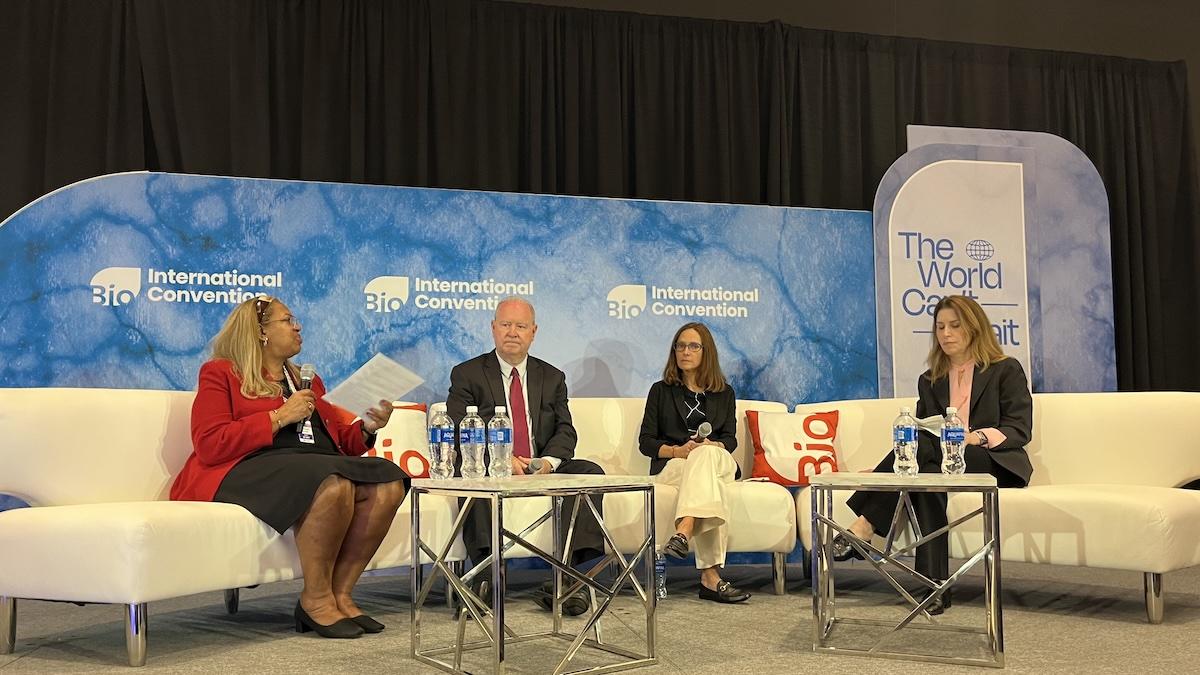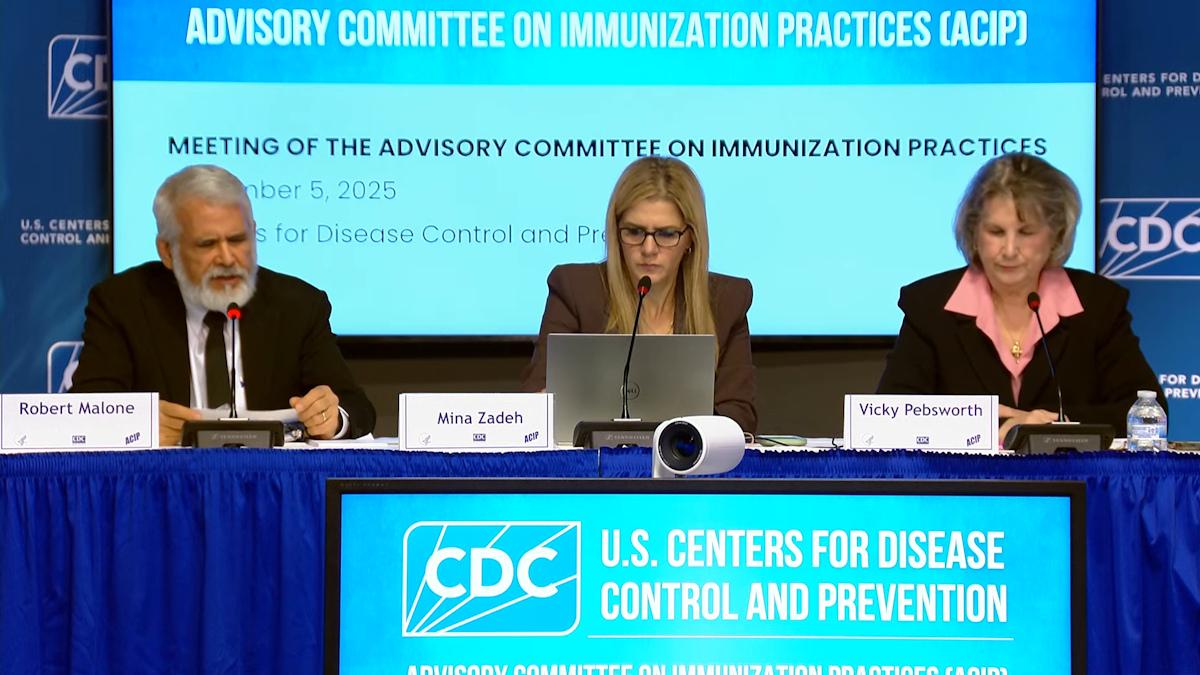BIO 2025: Planning, not panic, as BIO weighs in on US vaccination woes

(L to R) Phyllis Arthur, Dr Larry Buchson, Sherri Berger, and Dr Luciana Borio discuss vaccine skepticism at BIO 2025.
BIO 2025 this year came at a uniquely fraught moment for vaccination in the United States just days after HHS Secretary Robert F Kennedy Jr. took the shocking step of firing the CDC's Advisory Committee on Immunisation Practices (ACIP) and replacing them with largely unqualified and controversial appointees.
The speakers on the panel "Shifting Attitudes Toward Vaccines Among Lawmakers" -- which included BIO EVP and Head of Policy and Programs Phyllis Arthur, former Member of Congress Dr Larry Buchson, SB Strategies Founder and CEO Sherri Berger, and Council on Foreign Relations Senior Fellow for Global Health Dr Luciana Borio -- probably didn't know they would be in this situation when the panel was planned, but they ended up addressing the news during the Q&A portion of their panel.
What the ACIP regime change does and doesn't mean
Berger urged caution, advising attendees to "hope for the best and plan for the worst."
"The Advisory Committee on Immunisation Practices is a federal advisory committee of the US government," she said. "So it is bound by all the Faulkner rules and regulations including a very thorough review of conflicts of interest and a plan in which if there are conflicts, those are disclosed."
While ACIP recommendations effect whether insurers are required to cover vaccines, not being required doesn't mean they will opt out of covering them, she explained.
"Now that was not always the case and insurers were covering before that was in place," she said. "The economics are there. It is a lot less expensive to cover a vaccine than a hospitalisation. Where it gets much more complicated is the Vaccines for Children programme. Over 50% of children in this country are under or uninsured, which means they look to VFC to cover their vaccines. So if ACIP is not recommending, VFC is not required to fund. VFC is driven by CMS which is also part of the Department of Health and Human Services."
There are also state laws that name the ACIP specifically; Berger encouraged states to take steps to mitigate the damage of whatever might happen.
"States are now being encouraged to look at their own legislation and look to see where they might have to replace ACIP with 'a qualified expert panel' or a little bit broader language so that if ACIP is no longer making the recommendations we’ve all relied upon, that other groups can be turned to to make those same recommendations."
Arthur also noticed that ACIP recommendations can have implications on scope of practice, affecting what vaccines pharmacists can administer.
Berger also pointed attendees to the Vaccine Integrity Project, an initiative out of the University of Minnesota dedicated to exploring options for moving vaccine policy and infrastructure out of the federal government in the event that it ceases to perform those functions satisfactorily.
"There were eight overarching recommendations that came out of the work, but most importantly it's a call to action," she said. "There's a recognition that this is big, it's complicated, and no one organisation is going to be able to do this alone."
Harsh words from Shapiro, international defence from Makary
Elsewhere in the conference, Pennsylvania Governor Josh Shapiro, a Democrat and critic of the Trump administration, was much more full-throated in his condemnation.
"It is dangerous to me that politicians are being rewarded for spewing absolute bullshit when it comes to vaccines," he said during a fireside chat with BIO President John Crowley. "It's incredibly dangerous for public health. And I think we have a responsibility to not reward them politically and stand up against what they are putting out there."
He said he was "very concerned" about the moves around ACIP and that "it's incredibly dangerous what they're doing.
"I don't care if you're a Republican or a Democrat, be for science, be for reality," he urged attendees. "Don't live in this alternate reality they want to live in. Use your power to stand up for science and stand up for public health."
In his own fireside chat, also with Crowley, FDA Commissioner Martin Makary didn't discuss ACIP but did weigh in on his agency's decision to change policies around the COVID-19 vaccine recommendations, citing international comparisons and what he sees as a lack of strong data.
"In general we are moving closer to the European model," he said. "In the UK you have to be 75 years of age or have a high risk factor to have the COVID shot recommended to you. In France it's 80. We still have this approach based on a theory that every 12-year-old healthy needs another 60 doses for the rest of their life, one every year. It's not supported with good data for young healthy people, the repeat booster strategy, in my personal opinion. We would like to see updated clinical evidence to support recommending a yearly booster in healthy Americans and for high risk Americans we're going to continue with this framwework."
He acknowledged that the issue is contentious, but stood by his agency's decision.
"There's people on both sides of this debate who are angry," he said. "The people who want to have all these vaccines banned, they feel disenfranchised, they feel complications have not been appropriately studied. You can always do what will make groups happy, or you can do what you personally think is right. We decided to do what we thought was right."
De-politicising vaccination
Back at the panel on Shifting Attitudes, panelists universally agreed that industry and policy makers have to find a way to cool the rhetoric around vaccines and extract the topic from the country's toxic left-right dichotomy.
"I think one of the biggest mistakes that everyone made was politicising the issue. And I mean that on both sides of the aisle," Buchson, the former Congressman, said. "It was a dangerous precedent to use public health as a political tool on both sides of the aisle to try to win an election. And unfortunately that did happen."
Borio urged attendees to acknowledge that "choice is a deeply held value of Americans" and that is fueling a lot of the tension.
"These are products given to healthy people, and the public doesn't see the success. They only see the failures. Because the benefits are invisible, but the side effects are not. So now we're in this moment of reckoning," she said. "Vaccines have always been a public health tool and the framing was always population health. But people are very much focused on individual health. So maybe there's an opportunity to reframe from public health to what's good for the individual."
The scientific community has made a mistake in thinking that scientific arguments are enough, Buchson said.
"I think most lawmakers on both sides of the aisle will be amenable to a scientific argument, but you also have to recognise you can't disconnect what people's long-held values are with only a scientific argument," he said. "You have to recognise how people feel about vaccines and then message both the science and the emotions that it takes to penetrate the science into peoples' consciousness."
And, he added, that emotional message is most likely to land if it comes from a trusted source in someone's local community.
"At the end of the day you need to try to localise the issue," Buchson said. "I think the best messengers on public health are not only local officials but your own physician. Because that's where the trust lies is more on a localised level. All of our PSAs ended with 'Please talk to your physician and see if the COVID vaccine is right for you.'"












